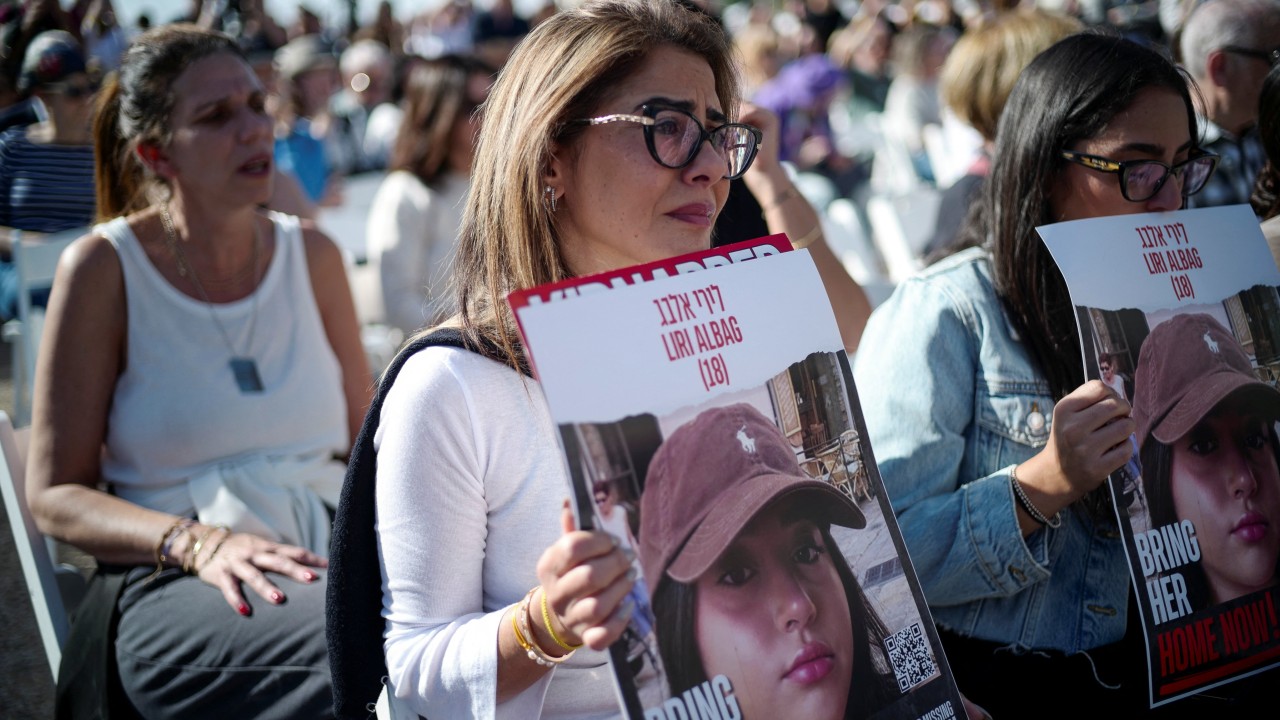El Salto (The Jump/The Waterfall)
2021 - Film & Video (Film & Video)
12:35 minutes
Juan Covelli
El Salto (The Jump/The Waterfall) by Juan Covelli depicts the Salto de Tequendama, a waterfall located on the outskirts of southwest Bogota. During the 19th and 20th centuries, the waterfall served as a national symbol that captured both the singularity of its geographical reference point, as well as the romantic experience of nature and immensity. The video installation arises from a detailed archive research into historic representations of Colombian landscape and reflection on their role in the present-day imaginary of the country and the wider world. The landscape is intervened with a green chroma key, so as to compose a meta-landscape. The screen turns into a projection surface—reminiscent of device-screens—a surface that today replaces painting and photography as a preferred site for the representation of reality. By means of neural networks, alternative landscapes are created and projected upon that surface so as to create a landscape within the landscape. In this narrative fiction, the landscape is not made from an anthropocentric view but rather from that of the machine. El Salto is the first iteration in a body of work titled Mirages , that seeks to integrate aspects of research and landscape history with audiovisual production. Engaging tools such as artificial intelligence, 3D capture, and modelling, as well as game development software such as Unreal Engine, Covelli’s goal is to make experimental video pieces that critically address the policies of technology. The use of machine vision shows how it reshapes our conception of natural surroundings and landscape, given that it approaches what the landscape supposes. Besides recognizing an iconography, it discovers ways of thinking and understanding our surroundings, framed within a specific culture and temporality. In El Salto , digital and representational technologies work in combination to narrate the waterfall’s history, and to present a new kind of view, one that allies nature and technology, attempting to subordinate the extractive human point of view.
Juan Covelli uses technology as a medium;, striving to decolonize the museum through digital practices, he releases archives from institutional control for the sake of emancipation. Covelli’s practice revolves around the technological potentials of three-dimensional scanning, modeling, and printing to readdress entrenched arguments of repatriation and colonial histories. His work investigates new materialities generated by the digital era, and focuses on the dynamics and approaches of the physical within the digital world, or the fluctuation between both. His work also explores the relationship between technology, heritage, archaeology, and digital colonialism. Using video, modelling, data sets, and coding he creates IRL and URL installation-based works which collapse historical practices with current models of display and digital aesthetics. In an on-going series of works titled Mirage, Covelli seeks to integrate aspects of research and the history of landscape, blending them with audiovisual production using some of his habitual tools (artificial intelligence, 3D capture, and modeling, as well as game development software), with the goal of making experimental video pieces that critically address the policies of technology.
Colors:
Related works sharing similar palette
» see more

© » KADIST
Shimabuku
2006For the two-channel work Asking the Repentistas – Peneira & Sonhador – to remix my octopus works Shimabuku asked two Brazilian street singers to compose a ballad about his previous works with octopi (in which he created traditional Japanese ceramic vessels to catch octopi, with a fisherman who took him on his boat to test them out as we can see on one of the channel)...

© » SOUTH CHINA MORNING POST
Opinion | How the word ‘hostage’ used to mean something quite different to its modern definition, as the Israel-Gaza war rumbles on | South China Morning Post Advertisement Advertisement Hostages who were abducted by Hamas gunmen during the October 7 attack on Israel are handed over by militants to the International Red Cross in an unknown location in the Gaza Strip on November 30, 2023...

© » HYPERALLERGIC
Two Pratt Graduate Programs Moving to Brooklyn Navy Yard Skip to content A view of Dock 72 with construction cranes in the background (photo by Rhea Nayyar/ Hyperallergic ) Two of Pratt Institute’s graduate programs are decamping from the Pfizer building in Bedford-Stuyvesant for a bayside view and expanded facilities at the Brooklyn Navy Yard later this year...
Related works found in the same semantic group
» see more

© » KADIST
Carolina Caycedo
2015Carolina Caycedo’s practice conveys her very personal passion and relationship to water, as a powerful necessity and spiritual reminder...

© » KADIST
Shahab Fotouhi
2013Shahab Fotouhi’s photographic series Establishing Shot; Interior, Night – Exterior, Day; without Antagonist and Extra consists of four C-prints that at first glance would appear to be travel posters for Iran, in that each features a beautifully shot image of an Iranian waterfall...

© » KADIST
Elena Tejada-Herrera
2019Las Bambas by Elena Tejada-Herrera takes the name of a copper mine in the Andean department of Apurímac, Peru...


